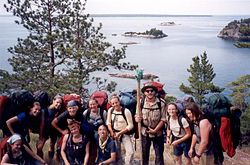Outward Bound

Outward Bound (OB) is an international, non-profit, independent outdoor-education organization with approximately 40 schools around the world and 200,000 participants per year.[1] Outward Bound programs aim to foster the personal growth and social skills of participants by using challenging expeditions in the outdoors.
History
The first Outward Bound school was opened in Aberdovey, Wales in 1941 by Kurt Hahn, and Lawrence Holt with the support of the Blue Funnel Line.[2] Outward Bound grew out of Hahn's work in the development of the Gordonstoun school and what is now known as the Duke of Edinburgh's Award. Outward Bound's founding mission was to give young seamen the ability to survive harsh conditions at sea by teaching confidence, tenacity, perseverance and to build experience of harsh conditions. James Martin Hogan served as warden for the first year of the school.[3] This mission was established and then expanded by Capt. J. F. 'Freddy' Fuller who took over the leadership of the Aberdovey school in 1942 and served the Outward Bound movement as senior warden until 1971.[4] Fuller had been seconded from the Blue Funnel Line following wartime experience during the Battle of the Atlantic of surviving two successive torpedo attacks and commanding an open lifeboat in the Atlantic Ocean for thirty-five days without losing a single member of the crew.[5] Peter Willauer led the founding of the Hurricane Island Outward Bound School with Miner's mentorship.
From the inception of Outward Bound, community service was an integral part of the program, especially in the areas of sea and mountain rescues and this remains an important part of the training for both staff and students in Outward Bound, Wales.[3] The first Outward Bound program for females was conducted in 1951. Fuller was seconded to the USA in the early sixties to help establish the Colorado Outward Bound School,[6] Outward Bound USA, and the first Peace Corps training camp in Puerto Rico.[7]
Some of the more notable Outward Bound teachers include James Kielsmeier, Stan Hugill, Tom Kennerley, Paul Petzoldt, Robert B. Rheault, Karl Rohnke, Peter Willauer, and Willi Unsoeld.[2][8][9]
Name

The name Outward Bound derives from a nautical expression that refers to the moment a ship leaves the harbor. This is signified by Outward Bound's use of the nautical flag, the Blue Peter (a white square inside a blue square). JF Fuller adapted the Outward Bound motto, "To Serve, To Strive and not To Yield," from the poem "Ulysses" by Alfred Lord Tennyson:
... Come, my friends.
Tis not too late to seek a newer world.
Though much is taken, much abides; and though
We are not now that strength which in old days
Moved earth and heaven, that which we are, we are --
One equal temper of heroic hearts,
Made weak by time and fate, but strong in will
To strive, to seek, to find, and not to yield.
Current
Since its founding in the middle of the last century, Outward Bound has encouraged individuals to test their physical and emotional limits in challenging outdoor adventure programs. The experiences are always life-changing: they are a means of building inner strength and a heightened awareness of human interdependence.[10] Outward Bound operates 40 schools in various countries and reports serving over 200,000 students each year. The Compass Rose serves as the logo for almost all the schools around the world.
Course specifics

Outward Bound courses follow a kind of recipe or formula, termed the Outward Bound Process Model which is well described by Walsh and Golins (1976)[11] as:
- Taking a ready, motivated learner
- into a prescribed, unfamiliar physical environment,
- along with a small group of people
- who are faced with a series of incremental, inter-related problem-solving tasks
- which creates in the individual a state of dissonance requiring adaptive coping and
- leads to a sense of mastery or competence when equilibrium is managed.
- The cumulative effect of these experiences leads to a reorganisation of the self-conceptions and information the learner holds about him/herself.
- The learner will then continue to be positively oriented to further learning and development experiences (transfer).
In a typical class, participants are divided into small patrols (or groups) under the guidance of one or more instructors. The first few days, often at a base camp, are spent training for the Outdoor recreation activities that the course will contain and in the philosophy of Outward Bound. After initial confidence-building challenges, the group heads off on an expedition. As the group develops the capacity to do so, the instructors ask the group to make its own decisions.[citation needed]
See also
- Outward Bound USA
- Outward Bound Costa Rica
- Outward Bound Singapore
- Outward Bound Australia
- Lack of physical education
References
- ^ Outward Bound International (2006). Annual report Retrieved December 22, 2007.
- ^ a b Outward Bound International (2004). Birth of Outward Bound. Retrieved December 9, 2007.
- ^ a b Outward Bound Wales, Aberdovey. Retrieved August 29, 2008.
- ^ James, David, (1957) "Outward Bound" Routledge and Kegan Paul, London.
- ^ Outward Bound USA: Crew Not Passengers. Mountaineers Books. 2002. ISBN 978-0-89886-874-6.
{{cite book}}: Unknown parameter|authors=ignored (help) - ^ Miner, Joshua and Boldt, Joe, Outward Bound USA: Crew Not Passengers, The Mountaineers, 2nd edition 2002, pp. 84-85
- ^ History: Kurt Hahn and Outward Bound Retrieved August 29, 2008
- ^ See also: Outward Bound USA History and Outward Bound Sea School.
- ^ Richards, A. (n. d.) Introduction: The inward odyssey of outward bound. Retrieved January 26, 2008
- ^ Outward Bound USA: Crew not Passengers, Josh Miner and Joe Boldt (Seattle: The Mountaineer Books, 2002)
- ^ Walsh, V., & Golins, G. L. (1976). The exploration of the Outward Bound process. Denver, CO: Colorado Outward Bound School.
